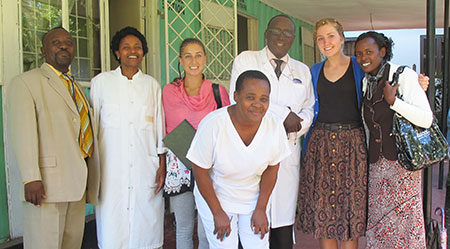Western Heads East in the News
Donate
Support Western Heads East by giving a financial gift here. To learn more about how your donations can help, please visit our Financial Gifts page.
Critical Global Learning
The rapid expansion of internationalization efforts in higher education worldwide has led to more students going abroad on practicum, volunteer and internship placements in development organizations or with community groups around the world. While a noble cause, many universities are ramping up their efforts, often at the expense of developing critically engaged students, but more significantly, at the expense of their host communities.
As an essential piece of developing partnerships with Western Heads East, we have put a strategic emphasis on the importance of critical and ethical global engagement. The key is to make sure students practice self-reflexivity – that they actively assess and address issues of power relations and that they truly listen to the voices, knowledge and goals of their partner organizations.
 Wait, what is self-reflexive practice?
Wait, what is self-reflexive practice?
Self-reflexivity is defined as “connecting our individual assumptions to collective socially, culturally and historically situated ‘stories’ and assumptions that define what is real, ideal (right) and knowable,” according to Professor Vanessa Andreotti of the University of British Columbia. That means thinking beyond self-reflection where we reflect on our personal experiences, and broadening our thinking to reflect on how historical, political and social structures contribute to global inequality, and our own position in that system. We encourage students to reflect on their own values, where they have come from, and apply that thinking to respecting and understanding diverse cultures.
Self-reflexive thinking can be applied to various components of an international experience, including how students prepare to go abroad, the experience itself, and how they share about and engage with their experience after returning. For instance, students are required to research their host country prior to departure, so to understand some of the historical and political issues that have existed there. Another theme of reflexive practice is considering ethical implications in students’ photography and social media posts about their international experience.
Andrea Burke, 2016 Western Heads East intern, shares an example of an issue that she struggled with during her internship:
“I would meet people, and they would ask me my name and where I was from, and the third thing they would ask is how they can get to Canada. I wasn’t expecting this, and it made me feel bad. I couldn’t sponsor them. I realized that something as simple as mobility was inaccessible.”
What is Western doing to engage critically and ethically?
All Western students who go abroad through university-sanctioned programs are required to complete online pre-departure training. Among the seven required sections, are “Critical and Ethical Global Engagement” and “Gender Norms and Sexual Violence.” These two sections are also complemented by in-person workshops that are mandatory for some programs, and open to all students who wish to attend.
Expanding our reach
On December 12 2018, a train-the-trainer workshop for 13 Western Faculty, staff and student leaders was organized by Western International, with the Centre for Teaching and Learning, Western’s Sexual Violence Educator, and Anova, a local community organization with expertise on sexual violence. The group engaged in dialogue about what constitutes critical and ethical global engagement and how we can enhance this learning with students going abroad. We did this by reflecting on our own approaches to facilitating learning about global engagement, and identifying strategies that encourage students to engage critically and ethically on a global scale as reflexive practitioners.
This training program enables more of the campus community to facilitate learning on these important topics with students going abroad. Another impact is greater learning about these issues on-campus. Student groups such as the Global Health Equity Collective and Western Heads East Fundraising and Education committee hold the workshops with their own membership at Western. The future of critical and ethical global engagement seeks to enable more peer-to-peer facilitation and connecting with more of the campus community to keep sharing diverse perspectives.

